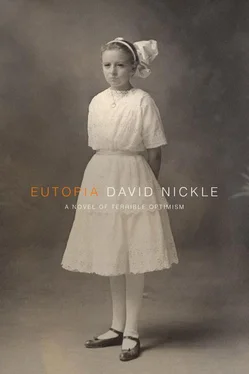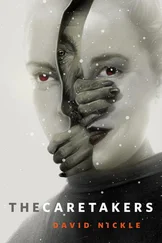“I won’t make you break your word,” she said, and cut a square of gauze. “I just pray he’s safe.”
“Safer than here,” said Jason. “Everybody keeps talking about this place as Utopia. I don’t know about that.”
“You don’t like it here?”
Jason laughed. “Oh it’s fine,” he said.
He’d spent the previous day out of the hospital, wandering the town while Aunt Germaine did her eugenics work. He could see how someone had set down a plan for it. The workers all lived in fine little houses in three roads, not one bigger than another, with space in back for a garden and some livestock. The roads were muddy, but they were wide—wide enough for little gardens in the middle. What he’d first thought was a church was a town hall, with space inside for big meetings and that motto— Compassion. Community. Hygiene. —repeated again and again where the walls met the ceilings.
The fellow who seemed to run the place told Jason they ran lessons for the young people two days out of the week from there. When the children of Eliada got a little bit older there’d be a proper school for them. In the meantime: would Jason like to stop by and learn some things?
Jason got out of there as fast as he could. He spent a little more time inside the sawmill. He would have stayed longer, watching the men run logs across the great whirling saw-blades, thinking how this was a kind of family he could join, something he could be. But a foreman spotted him and ushered him out into the road and Jason put thoughts of being a lumberman aside for another day.
In the end, he had wandered the town like he had wandered the train from Butte—hoping to catch a glimpse of pretty Ruth Harper, and finding other things instead.
“It’s a fine town,” said Jason. “Yet look what happened.”
Nurse Rowe gave a wry smile. “There’s no such a thing as Utopia, really. Not on earth. And for a Negro, that’s doubly true.”
“If that’s right,” said Jason, “I have to wonder why he’d come here. Why you’d come here, come to think of it. Seems like a long way to go to live a life as hard as you’d find anywhere else.”
“Wise boy,” said Annie.
Jason shrugged, and she laughed.
“Just because this place isn’t Utopia now, doesn’t mean it can’t be,” said Nurse Rowe. “There are ideals at work.”
Jason looked at Nurse Rowe sidelong. “Ideals. Like eugenical ideals?”
“Eugenical? Did you make that word up?”
“Maybe I did,” said Jason. “Eugenics is how I heard it. You know about eugenics.”
“I do. Mr. Harper speaks of it sometimes, as one of the pillars of Community. It’s all tied up with Hygiene.” She pointed to the door they’d come in. There were those words again, hung over the frame: Community. Compassion. And Hygiene.
“Mr. Harper?” Jason held out his hand so Nurse Rowe could wrap bandage over the gauze. “Haven’t met him yet. I met his daughter. Not him. I suppose I will at that picnic on Sunday. You two talk a lot?”
The bandage wrapped quickly, and Nurse Rowe cut it with a pair of scissors. “Oh no,” she said. “But I listen to him speak. He’s an inspiring fellow, is Mr. Garrison Harper.” She sat back on her stool, smoothed down her skirts. “It weren’t for him, I wouldn’t be here.”
Jason flexed his fingers and looked at the bandage. This one was better than the one Dr. Waggoner had put on him. That first bandage had started to peel back almost immediately. Nurse Rowe knew her bandaging.
“My aunt says she got inspired by a fellow like that,” he said. “Dr. Davenport was his name. He was lecturing at nurse school.”
“Well Dr. Davenport never came to lecture at my ‘nurse school.’ I heard Mr. Harper speaking in Chicago, in… the summer of 1907, I believe.”
“Didn’t know he went around making speeches. Did he have a tent like a preacher?”
“He might have in some of the other places he visited,” said Nurse Rowe. “He could get worked up as any evangelist. This one was in a hall. At the old World’s Fair grounds. I was accompanying my father, who had thought he might like to invest some money in Mr. Harper’s project.”
“Your pa was a rich man?”
“No,” said Nurse Rowe, and she tucked her chin against her neck as she rolled the remaining gauze back up and considered. “Not for lack of trying. But it seemed my father only ever had enough money to lose. He didn’t play cards, thank Heaven. But he fancied himself a speculator. When I was a little girl, he lost a great deal of money buying a stake in a gold mine in Montana that wound up a fraud. He had more success with real estate in the crash, and he was better at being a landlord. But that is not a rich man’s avocation. Not always.”
“So he got you worried,” said Jason, “that he might go and give Garrison Harper all the rest of your property—and you came along to see that he didn’t.”
Nurse Rowe covered her mouth to stifle another laugh. “You are a wise boy,” she said. “Young man. Excuse me. You’re a wise young man.” She looked up to the skylight, and leaned back on her stool. “I went along with him for exactly that reason,” she said. “And I wanted to see the World’s Fair, or what was left of it, one more time. You’d be too young to remember it—I am barely old enough. But my goodness… what a fantastical place it once was. The whole affair was strung with wires. Wires and electric lamps. It glowed like a fairyland after dusk. And in one of the pavilions—a scientist called Tesla put giant steel globes on poles and made lightning jump between them. You don’t forget a thing like that.”
Jason could see how. He’d first seen an electric light at work less than a month ago, in Butte. That tiny spark of brightness was enough to drop a fellow’s jaw. A man directing lightning from one ball to another? That was the business of old Zeus.
“Of course, by the time Mr. Harper set up his podium there, Dr. Tesla was long, long gone. The entire place had gone to seed. Many of the buildings had been torn down, and the pavilion that Mr. Harper had hired… well, it had seen better years. The paint on its entryway was peeling, and inside the plasterwork was crumbling. The pavilion still had some electricity, though. Enough to shine a very bright spotlight on Mr. Harper, and to run a projector to show some photographs on a sheet he’d hung from an archway.”
“Sounds fancy,” said Jason. Nurse Rowe smiled, like he’d been joking.
“I went in there thinking I’d just get my father out of there as soon as possible. As it turned out, I didn’t have to worry. Nothing Mr. Harper said did anything to convince Father that the mill-town in Eliada was a sound investment. I remember the tram ride home; he listed off all the problems. Eliada would be a logging town with nowhere to market its wood: the Kootenai flows north into wilderness in the Canadian territory The railway stops fifty miles or more south of Eliada, and Sand Point was already filling whole trains with wood. And stacked against all that, he said that Harper’s scheme to pay and look after his workers—it amounted to charity! He figured Harper for a mad socialist. He used those words. ‘He’s just another mad socialist, Annie. Best keep clear.’”
“You call this keepin’ clear?” Jason gestured with his bandaged hand.
“Well, when he said that, it caused me to think maybe Garrison Harper was a mad socialist. And maybe I was too. It was a fine speech. You haven’t met Mr. Harper yet, so you don’t know how he can be.”
“He’s a convincing fellow is he?”
“He convinced me,” said Nurse Rowe. “I’d just finished learning nursing at the American Medical Missionary College and was starting work at the Hinsdale Sanatorium. Don’t suppose you know about those places either, coming from where you do?”
Читать дальше









![David Jagusson - Fesselspiele mit Meister David [Hardcore BDSM]](/books/486693/david-jagusson-fesselspiele-mit-meister-david-har-thumb.webp)


